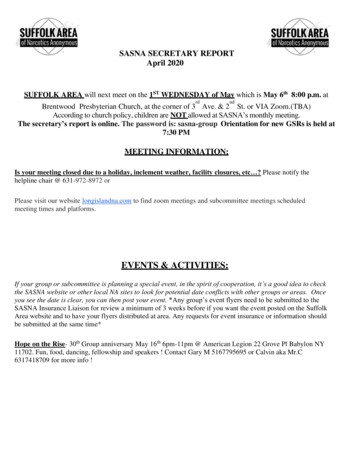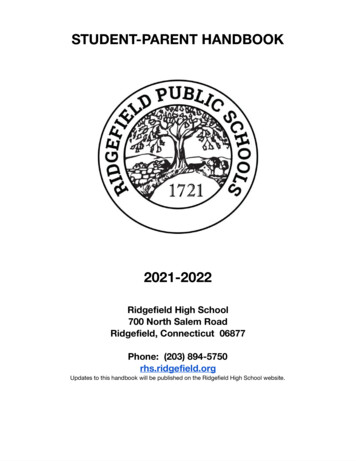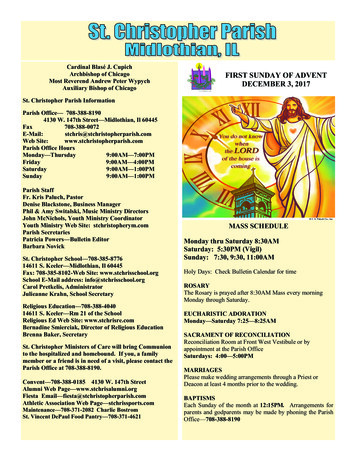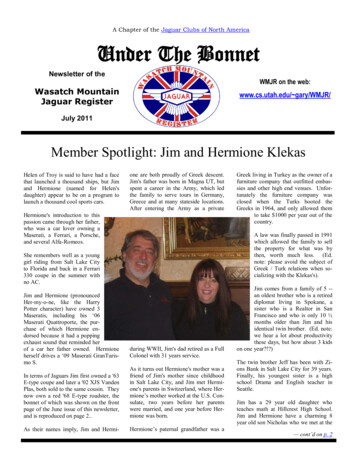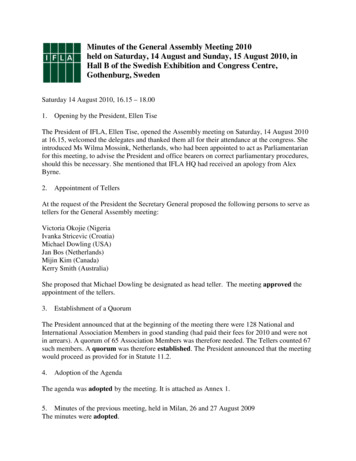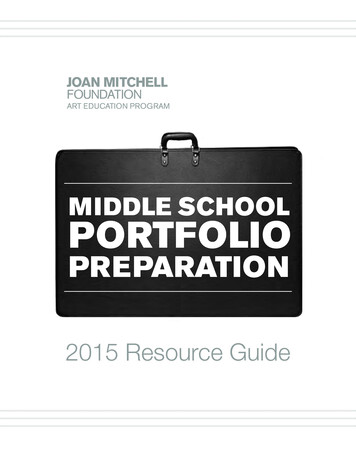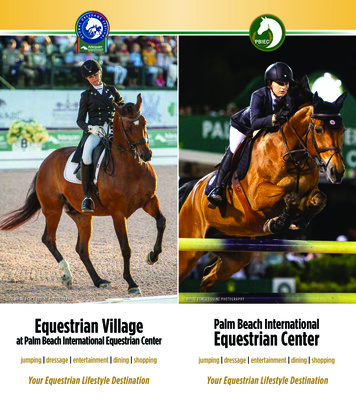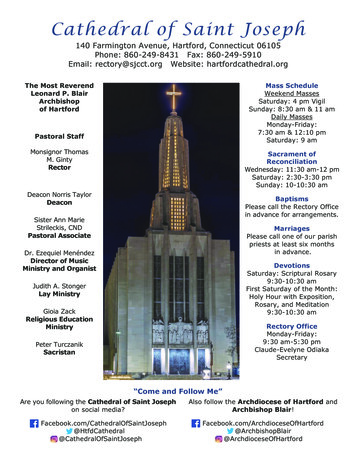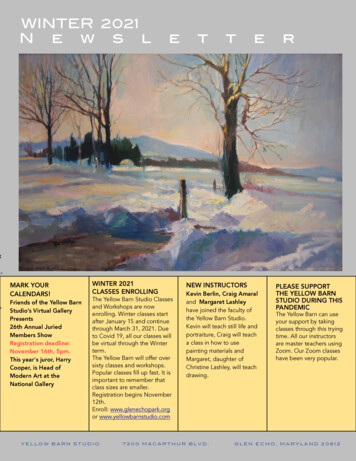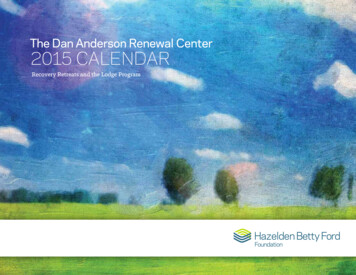
Transcription
Saturday, 7:00 a.m.–3:15 p.m.Saturday, April 9REGISTRATION, 8:00 a.m.–2:30 p.m.International Ballroom Exhibit Hall, International LevelExhibits, 10:00 a.m.–1:00 p.m.International Ballroom Exhibit Hall, International LevelTWO-YEAR COLLEGE SATURDAY PROGRAMSPONSORED BY THE TWO-YEAR COLLEGE ENGLISHASSOCIATION (TYCA)TWO-YEAR COLLEGE ENGLISH ASSOCIATION ANNUALBREAKFAST AND AWARDSImperial Ballroom, Salon B, Marquis Level7:00–8:00 a.m.Admission is by advance registration only.TYCA Executive Committee MeetingInternational Ballroom, Salon C, International Level9:00 a.m.-5:00 p.m.POETRY FORUMInternational Ballroom, Salon A, International Level12:30–1:45 p.m.GRADUATE STUDENT FORUMInternational Ballroom, Salon A, International Level2:00–3:15 p.m.CCCC CONVENTION, ATLANTA 2011InteriorPages 100283.indd 2652652/18/2011 2:36:23 PM
Saturday, 7:00–8:00 a.m.TYCA FAME AND SHAME AWARDSThe awards acknowledge the best and worst mentions of the two-year college appearingin any media during the previous year. The award calls attention to unfair practices aswell as gives credit to those reporters, writers, filmmakers, and others who seek outand publicize exemplary students, programs, and faculty.Winners are to be announced at the TYCA Breakfast.Fame and Shame Award Committee:Chair: Sterling Warner, Evergreen Valley College, San Jose, CAEric Bateman, San Juan College, Farmington, NMCarolyn Calhoon-Dillahunt, Yakima Valley Community College, WABarbara Cooper, Howard Community College, Columbia, MDMichael Dinielli, Chaffey College, Alta Loma, CABruce Henderson, Fullerton College, CAMarsha Nourse, Dean College, Franklin, MAHoward Tinberg, Bristol Community College, Fall River, MAPrevious Award Winners:Fame Winners2010Scott Jaschik, Inside Higher Ed, March 18, 2009, “Community College Surge”2009Dr. Jill Biden, Northern Virginia Community College, Annandale, VAHonorable Mention: Peter Schworm, The Boston Globe, January 21, 2009,“Brush with Destitution Fuels a Desire to Succeed”2008Gail Mellow, President, LaGuardia Community College, NY2007William D. Green, CEO, AccentureFirst Runner-Up: Matthew Santori, The Baltimore Examiner2006Dr. Betty Young, President, Northwest State Community College, Archbold, OH2005Clint Eastwood, Million Dollar Baby2004Dr. Tahita Fulkerson, Fort Worth Star Telegram2003Tracey Wong Briggs of USA Today2002Willard Scott of the NBC Today Show2001Black Issues in Higher Education, August 17, 2000, “Special Report: Community Colleges: Storied Success”Shame Winners2010The Pilot Episode of Community, the Sitcom (especially the promotionaltrailer), Writer/Producer: Dan Harmon2009Kim Clark, U.S. News & World Report, January 9, 2009, “CommunityColleges: Cheaper but Not Necessarily Better”2008Carlos Sadovi, Chicago Tribune, March 13, 2008, “Schools Don’t Do Enoughto Help Kids Get into 4-Year Colleges, Study Says”2007Orange County Register, Santa Ana, CA2006No Award Presented2005Jay Leno, NBC’s Tonight Show266InteriorPages 100283.indd 2662/18/2011 2:36:24 PM
Saturday, 7:00–8:00 a.m.2004200320022001Dr. Jim Lee, Fort Worth Star TelegramHeald CollegeMarch 7, 2002, episode of ERHope Reeves, New York Times Magazine, December 17, 2000, “Lives: Eveningthe Score”DIANA HACKER TYCA OUTSTANDING PROGRAMSIN ENGLISH AWARDS FOR TWO-YEAR TEACHERSAND COLLEGESThe awards are given annually to honor two-year teachers and their colleges for exemplary programs that enhance students’ language learning, helping them to achievetheir college, career, and personal goals.Winners are to be announced at the TYCA Breakfast.Outstanding Programs Award Committee:Chair: Louise Bown, Salt Lake Community College, UTElizabeth Butts, Delaware County Community College, PASheldon Wrice, Community and Technical College, University of Akron,OHLois Power, Fullerton College, CAPrevious Award Winners:2010Enhancing Developmental Education“The Accelerated Learning Program (ALP)”Community College of Baltimore County, Baltimore, MarylandHonorable Mention“Portfolio Assessment and Mentoring Program”Camden County College, Blackwood, New Jersey2009Category 1: Reaching Across Borders Award“Writing in the Disciplines”Montgomery College, Takoma Park, MD“SLCC Community Writing Center”Salt Lake Community College, Salt Lake City, UTHonorable Mention“Ready or Not Writing”Minnesota State Community and Technical College, Fergus Falls, MNSpecial Acknowledgment/Most Unique Initiative“Intercultural Literacy through Reflection: Rural Students Meet the UrbanExperience”State Fair Community College, Sedalia, MOCCCC CONVENTION, ATLANTA 2011InteriorPages 100283.indd 2672672/18/2011 2:36:24 PM
Saturday, 7:00–8:00 a.m.Category 2: Fostering Student Success Award“ESSAI The College of DuPage Anthology of Academic Writing Across theCurriculum”College of DuPage, Glen Ellyn, ILHonorable Mention“Building Community Online: Discussion Boards in a Two-Year CollegeOnline Writing Center”Century College, White Bear Lake, MNCategory 3: Enhancing Developmental Education Award“Serving the Literacy Goals of At-Risk Students through an Integrated Approach to FacultyDevelopment and Course Design”Kingsborough Community College, Brooklyn, NYHonorable Mention“Bursting the Bubble: Using Learning Communities to Create Authentic College Learning andInstruction”Front Range Community College, Westminster, CO2008Category 1: Reaching across Borders Award“The Arts in Ghana with Service Learning”The Ohio State University Agricultural Technical Institute, Wooster, OHHonorable Mention“Washington Online Writing Lab (WOWL)”Centralia College, WACategory 2: Fostering Student Success Award“YVCC English Department Mid-Program Assessment”Yakima Valley Community College, WAHonorable Mention“Increasing Agency and Collaboration through the Merging of SoTL andAssessmentUniversity of Wisconsin Colleges, Waukesha, WICategory 3: Enhancing Developmental Education Award“Gateway to Success”Santa Barbara City College, CAHonorable Mention“The W.R.I.T.E. Brush-up Course Program”Nassau Community College, Garden City, NYCategory 4: Enhancing Literature and Cultural Arts Award“Writing and Literature Program”Borough of Manhattan Community College, New York, NYHonorable Mention“Women’s Literature Read-In”Lansing Community College, MI268InteriorPages 100283.indd 2682/18/2011 2:36:24 PM
Saturday, 8:00–9:15 a.m.ANNUAL BUSINESS/TOWN MEETINGMarquis Ballroom, Salon B8:00–9:15 a.m.All members and newcomers of CCCC are invited to attend and vote at the businessmeeting.Chair: Gwendolyn D. Pough, Syracuse University, NYAssociate Chair: Malea Powell, Michigan State University, East LansingAssistant Chair: Chris Anson, North Carolina State University, RaleighPast Chair: Marilyn Valentino, Lorain County Community College, Elyria, OHSecretary: Duane Roen, Arizona State University, TempeCCCC Executive Secretary/Treasurer: Kent Williamson, NCTE, Urbana, ILCCCC Parliamentarian: Eric Bateman, San Juan College, Farmington, NMEstablished Rules for Conduct of the Annual Business Meetingl. All voting members should be properly identified, and only members in goodstanding may vote in the business meeting.2. A quorum of seventy-five members of CCCC in good standing is required for thetransaction of business in this meeting.3. Anyone wishing the floor should go to a microphone and give his or her name andinstitution when recognized by the chair.4. If procedural rules are adopted by a majority vote of the members present, a twothirds vote will be required to suspend or amend them.5. Members may offer for discussion and action a sense-of-the-house motion, asspecified in item 4 in the “Basic Rules for the Handling of Resolutions.” Suchmotions, if passed, will be broadcast to the members, not as an official CCCCstatement, but as the wish of the majority of the members voting at the AnnualBusiness Meeting. Sense-of-the-house motions can affect action by the ExecutiveCommittee, or another appropriate CCCC body, and can become the substance ofa resolution at the next annual convention.6. Sturgis’s Standard Code of Parliamentary Procedure applies on all questions ofprocedure and parliamentary law not specified in the Constitution, Bylaws, or otherrules adopted by CCCC.7. The Parliamentarian interprets the rules on parliamentary procedures.8. A secret ballot will be ordered by a motion to vote by secret ballot and an affirmative vote of at least ten membersProcedural Rules Proposed for Adoption at the Annual Business MeetingIn discussion of resolutions and all other items of business except sense-of the-housemotions:a. Three minutes will be allowed for each speaker each time.b. No one may speak a second time on a subject until all who wish to speak havebeen heard.CCCC CONVENTION, ATLANTA 2011InteriorPages 100283.indd 2692692/18/2011 2:36:24 PM
Saturday, 8:00–9:15 a.m.c. The presiding officer will attempt to provide a balance in recognizing pro and conspeakers. If there are no speakers opposing a motion under consideration, the chairmay ask the house to move immediately to a vote in order to expedite the business.d. Discussion will be limited to no more than fifteen minutes (not including discussionof amendments) on any main motion or resolution; this time may be extended inten-minute increments by consent of the body.e. Discussion of an amendment to a motion or resolution will be limited to no morethan ten minutes; this time may be extended in six-minute increments by consentof the body.f. Amendments to amendments will not be accepted, in order to avoid confusion.In discussion of sense-of-the-house motions:a. To be considered for deliberation, a sense-of-the-house motion must be preparedin writing, must not exceed 50 words, and must be submitted to the chair inthree copies before the call for the adoption of the agenda at the beginning of thebusiness meeting. (Brief prefatory statements in explanation of the motion are notpart of the motion and need not be submitted in writing.)b. A sense-of-the-house motion may not be amended, except for editorial changesacceptable to the mover.c. Speakers on sense-of-the-house motions shall be limited to two minutes each,except by dispensation of the chair.d. Discussion of sense-of-the-house motions shall be limited to ten minutes, exceptby dispensation of the chair.Basic Rules for the Handling of Resolutions at the Annual Business Meetingl. A call for resolutions will appear in the February issue of College Compositionand Communication. Proposed resolutions received by the chair of the ResolutionsCommittee two weeks before the conference require the signature of only fiveconference members; however, additional signatures are welcome as a means ofindicating the base of support for the resolution.2. The function of the Resolutions Committee is to review all resolutions presentedand to prepare resolutions of its own in areas in which it or the Executive Committeebelieves conference action is needed. Special attention will be given to includingareas covered in sense-of-the-house motions passed at the last Annual BusinessMeeting. In reviewing resolutions, the Resolutions Committee is responsible forcombining all resolutions that duplicate one another in substance and for editingall resolutions.The Resolutions Committee will report all properly submitted resolutions to theAnnual Business Meeting with a recommendation for action.Resolutions that call for conference action in the areas in which the CCCCConstitution assigns authority to the officers or the Executive Committee will beclearly labeled as advisory to the officers or the Executive Committee.270InteriorPages 100283.indd 2702/18/2011 2:36:24 PM
Saturday, 8:00–9:15 a.m.Resolutions of appreciation may be prepared by the CCCC officers and maybe presented by the Resolutions Committee.The Resolutions Committee will hold an open meeting during the Special Interest Group time period to clarify and discuss these resolutions with concernedconference members. It is especially urgent that the authors of resolutions or theirdelegates come to this meeting. Although no new resolutions may be added at thistime, members suggesting additional resolutions will be informed that they mayintroduce sense-of-the-house motions at the Annual Business Meeting in accordance with the rule give in item 4 below. The Resolutions Committee will also havea closed meeting after the open meeting to make such editorial and substantivechanges as the deliberations of the open meeting may suggest.3. As necessary, resolutions will be retyped so that complex changes will be incorporated into the copies of the resolutions distributed at the Annual Business Meeting.During the report of the Resolutions Committee at the Annual Business Meeting,one member of the Committee will read the “resolved” portion of each resolutionand move its adoption. Adoption will require only a simple majority of memberspresent. Action will be taken on each resolution before the next resolution ispresented.The CCCC officers at their post-convention session will determine thedissemination of, and the action to be taken on, all resolutions adopted.4. Members may offer sense-of-the-house motions for discussion and action. Suchmotions, if passed, will be announced to CCCC members, not as official CCCCstatements, but as the will of the majority of members at the Annual Business Meeting. Sense-of-the-house motions can affect action by the Executive Committee, orby another appropriate CCCC body, as well as become the substance of a resolution at the next annual convention. In order to be considered, sense-of-the-housemotions of no more than 50 words must be presented in writing (three copies) tothe chair of the Annual Business Meeting before the adoption of the agenda.CCCC CONVENTION, ATLANTA 2011InteriorPages 100283.indd 2712712/18/2011 2:36:24 PM
Saturday, 9:30–10:45 a.m.L Sessions: 9:30–10:45 a.m.Featured SpeakerCraig WomackTribally Specific Literature and Public ScholarshipMarquis Ballroom, Salon A, Marquis LevelThe presentation will feature a panel of graduatestudents who participated in a course entitled Community Approaches to Academic Research. Theclass was taught live via videoconference betweenEmory University and Muscogee Creek LanguageTeachers in Okmulgee, Oklahoma. The students engaged in interactions with Creek community leadersin Oklahoma and studied the ethical implications ofcommunity liaisons.Craig Womack teaches English at Emory University and is author of Art as Performance, Storyas Criticism.Craig Womack 2007, Kevin C. Rose/AtlantaPhotos.com272InteriorPages 100283.indd 2722/18/2011 2:36:24 PM
Saturday, 9:30–10:45 a.m.Featured SessionBalancing Visual Production and Analysis:Localized Pedagogies, Comic Interfaces, andAmerican Indian DesignMarquis Ballroom, Salon B, Marquis LevelAt the heart of this panel is a belief that visual communication instruction shouldbe an integral part of teaching writing. For nearly three decades, scholars incomposition, critical theory and professional communication (Barthes, 1977;Buchanan, 1989; Faigley, 1999; George, 2002; Hocks, 2003; Brumberger, 2007)have called for greater attention to the literacies needed to read and write contemporary texts. While much early work emphasized strategies for analysis ofexisting visual texts, more recent scholarship has called for developing practicesfor production of visual texts. This shift has opened many new possibilities forcomposing visually-purposeful and persuasive texts, but has also complicatedthe job of instructors who must now consider how to integrate tools for production into their curricula and pedagogy. This panel addresses the challenges ofpedagogically balancing visual production and analysis, and offers strategiesfor bridging the seeming gap between consumers and producers, visualizedand actualized designs, and form and function. A concern with putting visualanalysis and production into critical, purposeful, and relevant relation withone another and with larger concerns of composition, interface studies andAmerican Indian rhetorics will tie these presentations together.Chair:Jen AlmjeldNew Mexico State University, Las CrucesSpeakers:Jennifer SheppardNew Mexico State University, Las Cruces, “Balancing Act: A Guide to Analyzing Context and Developing a Technologically- Appropriate Approach toJennifer SheppardJames HaendigesKristin ArolaCCCC CONVENTION, ATLANTA 2011InteriorPages 100283.indd 2732732/18/2011 2:36:27 PM
Saturday, 9:30–10:45 a.m.Visual Communication Instruction”James HaendigesDixie State College of Utah, St George, “What You Imagine Is Not What YouGet: Rhetorical Negotiations in the Interface”Kristin ArolaWashington State University, Pullman, “Mindful Design: An Anishinaabe Approach to Visual Production”Community, Civic & PublicL.01 Expanding Conversation(s): Principled Resources,Strategies, and the Council of Writing ProgramAdministratorsRoom A701, Atrium LevelChair: Linda Adler-Kassner, University of California, Santa BarbaraSpeakers: Linda Adler-Kassner, University of California, Santa Barbara, “Framing the Conversation: Resources, Strategies, and the Council of WritingProgram Administrators”Charles Paine, University of New Mexico, Albuquerque, “On the Road: CWPADialogues with TYCA and IWCA”Susan Thomas, University of Sydney, St. Ives, Australia, “sane as /charlesDarsie Bowden, DePaul University, Skokie, IL, “On the Page and the Screen:The WPA Network for Media Action”Peggy O’Neill, Loyola University, Baltimore, MD, “On the Map: The Frameworkfor Sucess in Postsecondary Writing”Contesting BoundariesL.02 Embodied Digital Pedagogies: Intermodal Composing,Re-membering, and AccessMarquis Ballroom, Salon D, Marquis LevelChair: Kristie S. Fleckenstein, Florida State University, Tallahassee, FLSpeakers: Maggie Christensen, University of Nebraska Omaha, “EmbodiedRhetoric in Digital Writing”Tammie M. Kennedy, University of Nebraska Omaha, “Embodied MultimodalCompositions and Re-membering in Feminist Historiography”Katie Gindlesparger, Philadelphia University, PA, “Multimodal Access and Addressed Audiences: Teaching Radio in a Community Literacy Program”274InteriorPages 100283.indd 2742/18/2011 2:36:28 PM
Saturday, 9:30–10:45 a.m.LanguageL.04 (Re)Defining Translingual WritingImperial Ballroom, Salon B, Marquis LevelChair: Bruce Horner, University of Louisville, KYSpeakers: Bruce Horner, University of Louisville, KY, “Toward TranslingualWriting Dispositions”Paul Kei Matsuda, Arizona State University, Tempe, “Translingual Writing asRhetorical Action”Suresh Canagarajah, Pennsylvania State University, State College, “Strategiesof Translingual Writing: Learning from Students”Respondent: Min Lu, University of Louisville, KYContesting BoundariesL.05 Fans, Fandom, and Fanzines: Contesting BoundariesRoom M101, Marquis LevelChair: Paula Mathieu, Boston College, Chestnut Hill, MASpeakers: Shonell Bacon, Texas Tech University, Lubbock, “‘What are youreading that for?’: The Romance Novel for African-American Readers”Katherine Tanski, Purdue University, West Lafayette, IN, “A/Ns, Betas, andConCrit: The ABCs of Fandom’s Composition Theory”Amylea Clemons, Francis Marion University, Florence, SC, “A/Ns, Betas,and ConCrit: The ABCs of Fandom’s Composition Theory”Tim Lockridge, Virginia Tech, Blacksburg, VA, “Into the Archives of Participatory Culture: Remediating Print Fanzines and Digital Collaboration”Teaching Writing & RhetoricL.06 Instructor Feedback in ESL Writing CoursesRoom M102, Marquis LevelChair: Sarah Kegley, Georgia State University, AtlantaSpeakers: Debra Snell, Georgia State University, AtlantaSarah Kegley, Georgia State University, AtlantaSharon Cavusgil, Georgia State University, AtlantaRespondent: Sharon Cavusgil, Georgia State University, AtlantaCCCC CONVENTION, ATLANTA 2011InteriorPages 100283.indd 2752752/18/2011 2:36:28 PM
Saturday, 9:30–10:45 a.m.Contesting BoundariesL.07 Crossing Boundaries with STEM Discourse in theUndergraduate Writing CurriculumRoom M103, Marquis LevelChair: Joanna Wolfe, University of Louisville, KYSpeakers: Sarah Perrault, University of California, Davis, “Teaching CriticalTechnoscience Literacy in a General Education Course”Kenneth Walker, University of Arizona, Tucson, “Multiliteracies and STEMGenres in first-Year Writing Courses”Joanna Wolfe, University of Louisville, KY, “Using STEM Genres in a FYCWriting Studies Curriculum”Writing ProgramsL.08 Writing Assignments, Argumentation Strategies, andSocial Identities: Three Views of Writing in the DisciplinesRoom M104, Marquis LevelChair: Roger Graves, University of Alberta, Edmonton, CanadaSpeakers: Roger Graves, University of Alberta, Edmonton, Canada, “Assignments across the Curriculum, a Meta-Analysis”Susan Chaudoir, University of Alberta, Edmonton, Canada, “Assignments acrossthe Curriculum, a Meta-Analysis”Heather Graves, University of Alberta, Edmonton, Canada, “‘There Are MorePlants Yet to be Described:’ The Structures of Argument in AcademicDiscourse”Kathryn Alexander, University of Western Ontario, London, Canada, “Becoming Writers in Disciplinary Spaces: Investigating the Genre System of theProfessional Writing Portfolio”TheoryL.09 The (Im)Possibilities of Rhetorical Witnessing:Theory, Methodology, and PedagogyRoom M105, Marquis LevelChair: Christine Farris, Indiana University, Bloomington,Speakers: Laura Sparks, Indiana University, Bloomington, “Rhetorical Witnessing and Public Performance in Anne Askew’s Examinations”Ira Allen, Indiana University, Bloomington, “Witness, Rhetoric, Loss”Christopher Basgier, Indiana University, Bloomington, “Multimodal Witnessing: Notes toward a Research Methodology for Composition”Lavinia Hirsu, Indiana University, Bloomington, “The Limits of RhetoricalWitnessing in the Composition Classroom”Respondent: Elizabeth Flynn, Michigan Technological University, Houghton276InteriorPages 100283.indd 2762/18/2011 2:36:28 PM
Saturday, 9:30–10:45 a.m.Teaching Writing & RhetoricL.11 4 REAL: Student Researchers Bring Rhetorical Educationin America to LifeRoom M107, Marquis LevelChair: Jenn Fishman, University of Tennessee-KnoxvilleSpeakers: Kathryn Earle, University of Tennessee-Knoxville, “ReinventingHodges’ Harbrace Handbook”Matt Ailey, University of Tennessee-Knoxville, “Citizen Chat”Leah Partin, University of Tennessee-Knoxville, “Leaning (in) Online Games”Laura Sceniak, University of Tennessee-Knoxville, “Altering History, AlteringBooks: Reading Women into the Postbellum Record”Keri Stafford, University of Tennessee-Knoxville, “Show, Tell, Learn”LaKesha Thompson, University of Tennessee-Knoxville, “Calling It In: Frederick Douglass Talk Radio”Respondents: Cheryl Glenn, The Pennsylvania State University, University ParkNan Johnson, The Ohio State University, ColumbusSusan Kates, University of Oklahoma, NormanRich Lane, Clarion University, PAContesting BoundariesL.12 Mentor. Teach. Write. Relating People and ProgramsRoom M108, Marquis LevelChair: Beth Buyserie, Washington State University, PullmanSpeakers: Beth Buyserie, Washington State University, Pullman, “RelatingPeople and Programs: Administrative Perspectives on Teacher-StudentAchievement and Success”Donna Evans, Washington State University, Pullman, “Mentor. SupportingTeachers Peer-to-Peer”Stephanie L. Schatz, Purdue University, West Lafayette, IN, “Teach. Empowering Students through a Pedagogy of Inclusion”Sheri Rysdam, Washington State University, Pullman, “Write. The Labor ofStudent Learning”CCCC CONVENTION, ATLANTA 2011InteriorPages 100283.indd 2772772/18/2011 2:36:28 PM
Saturday, 9:30–10:45 a.m.TheoryL.13 Traversing the Borderlands of Arab(ic) Rhetoric:Contesting the Boundaries of Language, Literacies, andKnowledge ProductionRoom M109, Marquis LevelChair: Nicole Khoury, Arizona State University, TempeSpeakers: Maha Baddar, University of Arizona, Tucson, “From Athens (ViaAlexandria) to Baghdad: Hybridity as Epistemology in the Medieval ArabicTranslation Movement”Lauren Connolly, University of Texas El Paso, “Weaving the Tales of (Her)stories: Using Transnational Narratives to Redefine the Boundaries ofKnowledge”Nicole Khoury, Arizona State University, Tempe, “Muslim Women’s SelfIdentification in Islam and the Importance of Ijtihad”Contesting BoundariesL.14 Contesting Cultural Diversity in the CompositionClassroom: The Disconnect between Definition andPerformance of DiversityRoom M202, Marquis LevelChair: Michelle Bachelor Robinson, University of Alabama, TuscaloosaSpeakers: Phillip Blackmon, Alabama State University, Montgomery, “It’sall about Me, I think? Contested Spaces: Firing the Canon for CulturalDiversity in the Classroom”Allison Egnew Smith, Lindsey Wilson College, Columbia, KY, “WritingBasically on the Border: Using Experimental and Self-Motivated Writingto Encourage Academic Success in the Basic Writing Classroom”Michelle Bachelor Robinson, University of Alabama, Tuscaloosa, “Writingabout Cultures: Isn’t that Diversity?”Contesting BoundariesL.15 Legal Policy and Discursive NormsRoom M302, Marquis LevelSpeakers: Frank Walters, Auburn University, AL, “Intersected Rhetorics: LeftLegal Critique and the Culture of Composition”Katrina Powell, Virginia Tech, Blacksburg, “Letters, Case Law, CommitmentPapers, and Oral Histories: Understanding Rhetorics of Displacementthrough Layers of Relations”Jennifer Maher and Catherine Fox, University of Maryland, Baltimore Countyand St. Cloud State University, MN, “Interrupting Epistemological Colonization: Indigenous Resistance to Global Trade Laws and IntellectualProperty Rights”278InteriorPages 100283.indd 2782/18/2011 2:36:28 PM
Saturday, 9:30–10:45 a.m.Teaching Writing & RhetoricL.16 Questioning in the Margins: Teacher FeedbackRoom M303, Marquis LevelChair: Kimberly Thomas, Indiana University of PennsylvaniaSpeakers: Jeremy Branstad, Boise State University, ID, “Comments and theClassroom Context: Investigating Student Understandings of InstructorResponse”Judy Dyer, University of Michigan, Ann Arbor, “The Use of Questions in Writing Tutorials: A Case Study”Jason Loan, The University of North Carolina at Chapel Hill, “DistributingMarginalia: Teacher-Response, New Media, and Networks”Teaching Writing & RhetoricL.17 Teaching the CrisisRoom M304, Marquis LevelSpeakers: Sarah Klotz, University of California, Davis, “Teaching the Crisis:Critical Writing Pedagogy in the UC System and Beyond”Scott Rogers, University of Louisville, KY, “Sponsoring Recovery after Katrina: Rethinking Writing Instruction in the Wake of a Large-Scale Public‘Trauma’”Joyce Fleming, St. Petersburg College, FL, “Ayn Rand, Oil Spills and JerseyShore . . . There Is an ‘I’ in Community”Contesting BoundariesL.18 The ‘Tangled Roots’ Of Creative Writing and Compositionin the ClassroomRoom L401, Lobby LevelSpeakers: Mary Fiorenza, University of Wisconsin-Madison, “Pedagogies ofPractice: Writing with Lynda Barry, Julia Cameron, and Natalie Goldberg”David DiSarro, Ball State University, Muncie, IN, “Contested Spaces: Activity,Pedagogy, and Products in First-Year Composition and Introductory CreativeWriting Classrooms”Khem Aryal, University of Missouri, Columbia, “Writing Relatives with Competing Loyalties: Composition and Creative Writing under New Scrutiny”CCCC CONVENTION, ATLANTA 2011InteriorPages 100283.indd 2792792/18/2011 2:36:28 PM
Saturday, 9:30–10:45 a.m.Contesting BoundariesL.19 Where Rhetoric Ends and Violence Begins:Theorizing Relationships between Bodies and SpacesRoom L402, Lobby LevelSpeakers: Deborah Shaller, Towson University, MD, “In the Absence of Dogs:A Poetics of Relationship”Daniela Ragusa, Capital Community College, Hartford, CT, “Town vs. Gownin New Haven, Connecticut: Community College Students Play the Confidence Game in the Shadow of the Ivy Tower”Jared Colton, Clemson University, SC, “From the Religious to the Secular:Rhetorics of Community and Immanence”Teaching Writing & RhetoricL.20 Graphic Narratives:Exploring Intertextuality and Multi Modal WritingRoom L403, Lobby LevelChair: Andrea Lunsford, Stanford University, CASpeakers: Alyssa O’Brien, Stanford University, CA, “Graphic Narrative Storyboarding and Intercultural Competencies”Haerin Shin, Stanford University, CA, “Motion: How Constantly Surfing andTexting College Students Consume, Analyze and Appreciate GraphicNarratives”Helle Rytkonen, Stanford University, CA, “What’s So Funny? Graphic Narratives in the Cross-Cultural Writing Classroom”Lee Konstantinou, Stanford University, CA, “Teaching Graphic Narrativesas ‘Evidence’ in College Arguments”L.21 Think-Tank for Newcomers Developing Papers andSessions for CCCC 2012Room L406, Lobby LevelChair: Paul Puccio, Bloomfield College, NJTeaching Writing & RhetoricL.22 Exploring New Inventional Spaces for Writing TeachersRoom A704, Atrium LevelSpeakers: Don Kraemer, California State Polytechnic University, Pomona,“The Supreme Court vs. Writing Studies: A Split Decision”Mary Lindberg, College of Mount Saint Vincent, Riverdale, NY, “A Picture isWorth a Thousand Words or Less”Candice Welhausen, Georgia Institute of Technology, Atlanta, “Composingin Dynamic Spaces: Considering the Rhetoricity of Time and Motion viaPSA Assignments”280InteriorPages 100283.indd 2802/18/2011 2:36:28 PM
Saturday, 9:30–10:45 a.m.Teaching Writing & RhetoricL.23 Invention, Discovery, Knowledge Production:What Are Ideas Made Of?Room A705, Atrium LevelChair: Leigh Cremin, Eastern Connecticut State University, WillimanticSpeakers: Justin Thurman, LaGrange College, GA, “What Ideas Are MadeOf: Lynda Barry’s What It Is and Challenging the Contested Space of theComic Book in Composition”George H. Cooper, University of Michigan, Ann Arbor, “Invention as an Endin Itself: The Ontological Possibility of Ongoing Discovery”Ruijie Zhao, Parkland College, Champaign, IL, “YouTube—A ContestedSpace to Produce Knowledge during the Invention Stage”Contesting BoundariesL.24 An Ethical Response to MonstersRoom A706, Atrium LevelSpeakers: Andrew Holladay, University of Louisville, KY, “Democratic Deliberation and the Composition Classroom: Moving Beyond Policy-Center
CCCC CONVENTION, ATLANTA 2011 267 Saturday, 7:00-8:00 a.m. 2004 Dr. Jim Lee, Fort Worth Star Telegram 2003 Heald College 2002 March 7, 2002, episode of ER 2001 Hope Reeves, New York Times Magazine, December 17, 2000, "Lives: Evening the Score"
